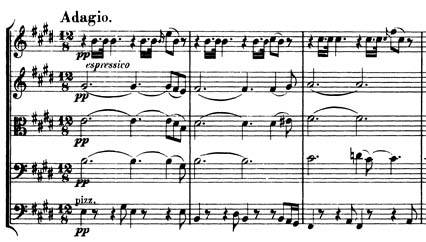Examiner.com: Nothing secondary about the second cello
Examiner.com
April 27, 2010
by Stephen Smoliar

One of my music teachers told me a beautiful joke about Igor Stravinsky and Franz Schubert. The story was that Stravinsky told friends that he would always fall asleep during a performance of Schubert's music; but then he would awaken and find that he was in Heaven. I have always believed that Stravinsky's moment of awakening took place at the beginning of the second movement of Schubert's D. 956 string quintet in C major, even if I felt strongly that there was absolutely nothing soporific about the first movement. This work was composed just month's before Schubert's death, and one can let one's Romantic imagination run wild and almost see one set of Angels preparing for his Ascension while another five are hard at work rehearsing this movement.
From a more secularly dispassionate point of view, there is no doubt that this entire quintet is some of Schubert's finest chamber music writing, particularly when it comes to the way in which each instrument has its own characteristic role. This is why the above claim that there is nothing secondary about the second cello is more than a clever play on words; and the best way to appreciate this is to consider the opening of the second Adagio movement, as provided in the above illustration. The movement begins as a conversation between the outer voices, the first violin and second cello, set against an almost homophonic accompaniment in the inner voices (second violin, viola, and first cello) with only the subtlest ripples of rhythmic movement. On Sunday I wrote about approaching each of Schubert's D. 899 impromptus as a "song without voice." From that point of view this Adagio is a duet without voice; and the impact is just as profound, if not more so.
A piece of chamber music that can only be described through such superlatives clearly deserves a performance that can live up to those superlatives. Today's Noontime Concerts™ recital at Old St. Mary's Cathedral may have been as close to such a performance as one is likely to encounter. Jean-Michel Fonteneau played that all-important second cello part serving as guest artist with the members of the Cypress String Quartet, violinists Cecily Ward and Tom Stone, violist Ethan Filner, and cellist Jennifer Kloetzel. The Cypress seems to have a way with Schubert that I never fail to enjoy, my most recent experience being with the D. 810 quartet in D minor ("Death and the Maiden") at Herbst Theatre last February; so the only real question in my mind was with what would happen when they brought a guest into their midst. As a member of the faculty of the San Francisco Conservatory of Music, Fonteneau has had abundant opportunities to "play well with others;" and this encounter was no exception. He was particularly adept at maintaining eye contact with all members of the quartet; so his "conversation" with Ward's violin in the second movement was as intimate and effective as his cello duet passages with Kloetzel in the first. Most important was that his was the responsibility of the bass line for the entire ensemble, and through that responsibility we could drink in all the richness of Schubert's harmonic ventures.
As to that Romanticized fantasy of the Angels, it is worth noting that it rained for the better part of this morning in San Francisco. When I emerged from Old St. Mary's after the performance, the sun was shining. The Angels still know how to honor Schubert!